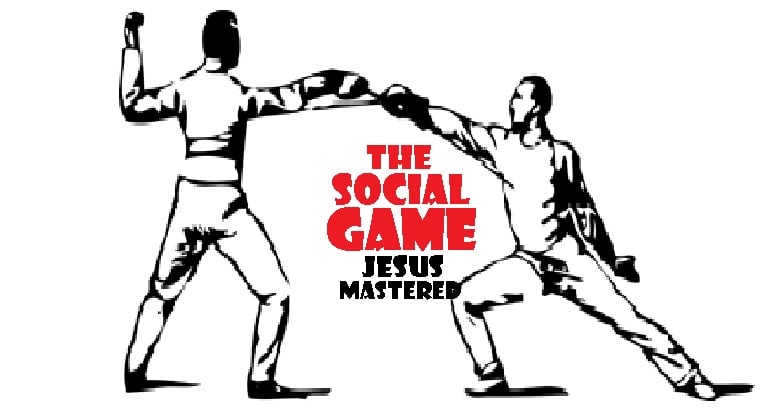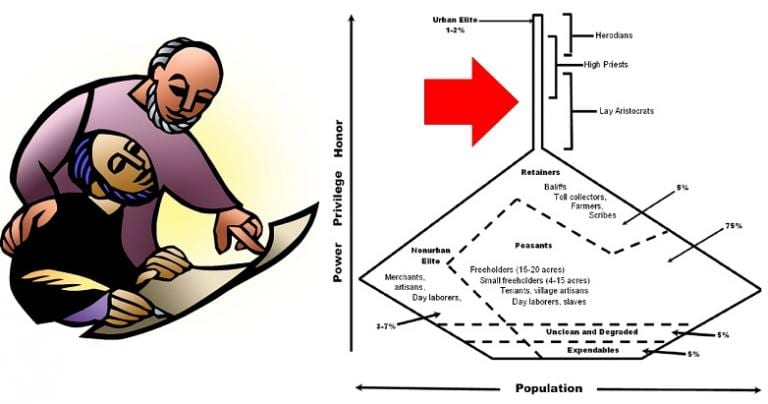
Jesus mastered a Mediterranean social game to defend and acquire his honor.
Social experts explain that the circum-Mediterranean world has been conflict-prone for millennia. This is the cultural world of Jesus, called “meek” and “gentle.” Meek and gentle Jesus, master of the insult? Yeah, right.
Is there ever a time in the gospels when Jesus isn’t involved in some conflict? If so, those times are very few. Same thing with his followers! Like Jesus, they are always pissing people off and causing problems. Go look through the entire book of Acts and count the times Jesus’ followers wind up in court.
American Christians may not care about honor, but Jesus and his movement did, bigtime. There are two ways to get honor in their cultural world.
To understand this and its social game, watch the following video presentation—
Honor & Shame In A Social Game
As I post constantly, honor and shame are the core cultural values of all Mediterranean peoples. That includes first-century Israelites like Jesus. Stop calling Jesus counter-cultural. He wasn’t.
Honor—a public claim to worth and the public recognition of that claim—was paramount to Jesus’ culture. From kings to dying beggars, everybody was presumed to have some degree of honor. And to defend and maintain that honor, anything goes and often did. That’s how biblical people spent their lives—safeguarding and preserving their honor-rating. Ultimately, feeling honored or shamed produced much anxiety and conflict.
How did biblical people primarily get their honor? As the video below explains, just by being born.
As Dr. Richard Rohrbaugh explains, Jesus and all his Mediterranean contemporaries were born into honor. Scholars like Rohrbaugh call this “ascribed” honor. People do nothing to receive it, so it is therefore passive. In fact, individuals don’t really have it so much as their family does. Jesus and everyone else in his cultural world principally derived honor from the family into which they were embedded.
Family Honor
If you understand this, you will see why family is vital in any biblical discussion about honor. And this is why the Bible is filled with genealogies. They have nothing to do with genetics, Western-style biographies, Ancestry.com, medical history of disease, or our culture’s interests in lineage. Instead, they broadcast to the world someone’s ascribed honor. By the way, Biblical genealogies (honor pedigrees) are mostly fictional.
Why is the Bible filled with genealogies like 1 Chronicles 1—10, Matthew 1:1-17, and Luke 3:23-38? It’s because everything in the Mediterranean cultural world of Scripture revolves around honor. The Mediterranean authors of Scripture, therefore, inform their Mediterranean audiences, “Look! See this man’s genealogy? He’s honorable because his whole ancestral line is filled by honorable heroes.”
Acquired Honor & The Social Game
But as Dr. Rohrbaugh explains, there was another way to obtain honor beside it being “ascribed” to you at birth. Biblical people could earn and achieve relatively small growths in honor. Scholars like Rohrbaugh call this honor “acquired.” But how could biblical people acquire it?
Heroic deeds, beneficent works helping the community, and demonstrations of Mediterranean manliness all could win honor. But the mean way honor is acquired in the Mediterranean social world happens through a social game played by everyone there constantly, called challenge and riposte. And lowly Jesus, starving Galilean peasant, mastered it. He was the Michael Jordan of challenge and riposte.
Ready To Play The Social Game?
How do you play the game? Mediterraneans compete for honor. They attempt to catch their social equals off guard so they can challenge their honor rating. So, they put their peers into catch-22 situations, disabling them from responding appropriately and defending their status. Consequently, they shame their opponent, thereby gaining the lost honor.
This is a lot like Western fencing. Hence the expression, “challenge and riposte.” In competition, fencers “riposte” when they respond to an attack by successfully parrying and then thrusting their sabre for a hit. This translates to the social game Jesus played so well when he masterfully replied speedily to all insults or criticisms by generously giving back in kind to all his challengers.
A Social Game For Starting Fires
Everyone in the Mediterranean plays this game of push and shove, challenge and riposte. All such people, like Jesus, are salty. In the Galilee of Jesus’ day, salt wasn’t primarily or even remotely seen as a preservative or a seasoning. Instead, salt was understood to be a catalyst. Jesus was a Mediterranean master at igniting conflict.
People who play this kind of social game (i.e., everyone in Mediterranean culture) can undoubtedly be called “catalytic.” They love to light the fires of conflict.
The Grievance
Consider the conflict underlying Mark 7:1-23. You cannot have conflict without first having a grievance. Understand that the aggrieved parties are Pharisees and scribes, retainers for about two percent of the total population, the urban elite (Mark 7:1). Their grievance? Jesus’ followers didn’t follow the customs of “the Great Tradition” (Mark 7:2-5).

The Jerusalem elites dominated everything in Herodian Palestine—writing, coinage, tolls, military, and courts. Only they and their retainers could afford to practice the so-called “Tradition of the Elders.” This “Great Tradition” was the “official” version of religious customs. The Jerusalem elites used a religious and educational bureaucracy to legitimize their domination and exploitation of the agrarian surround, swallowing up peasant ancestral lands Galileans needed for subsistence farming.

Jerusalem elites would look at Jesus and his Galilean peasant band as rebels in the pejorative sense. The anonymous evangelists, being literate elites, also would interpret Jesus as a rebel and praise him for being one. But was the historical Jesus truly a rebel or iconoclast? What if he and his followers were just starving peasants who couldn’t afford to keep the “Great Tradition” even if they wanted to?
Regardless, elites and their retainers hold a grievance against Jesus. Unwashed Jesus and his unwashed Galilean followers committed shameful behavior, improper and dishonorable (v. 2). The proper and honorable behavior was to keep the Great Tradition (Mark 7:3-4). In other words, being an unwashed Galilean equaled being lawless, and thus, an enemy of God.
The Social Game Begins
So the urban elite retainers—Pharisees and scribes—challenged Jesus’ honor (Mark 7:5). They saw the Jesus-faction as competing with theirs. Everyone competed for honor in this world.
How does Jesus riposte (Mark 7:6-15)? The typical Jesus-way, by insulting the bejesus out of them. He calls them his favorite insult, ὑποκριτῶν (mask-wearers, actors). Jesus was master of insults.
Jesus quotes Isaiah 29:13 (Mark 7:6-7) to expose these keepers of the “Great Tradition” as speakers of lines, but not doers. Then, Jesus counter-challenges by claiming these actors are disloyal to the God of Israel (Mark 7:8). He invites the crowd to see how these bastards treat their fathers and mothers (Mark 7:9-13).
Keep in mind what honor is—socially acknowledged worth. Honor is both a public claim to value and the public recognizing that claim. Jerusalem elites and their retainers made a claim to honor and tried to shame Jesus and his faction. Therefore, Jesus makes a counter-claim to honor and ripostes those challengers attempting to besmirch his honor. Question: who is watching all this?
The Public Decides Who Wins the Social Game
Read carefully Mark 7:14. This exchange between Jesus and the Jerusalem retainers was public. The crowd plays a vital role here—they decide to affirm or deny claims of honor. Who do they honor? Is it Jesus and his faction, or the Jerusalem scribes and Pharisees? What role must “the people” play in this episode? Doesn’t the culture expect “the public” to affirm or deny the claim to honor? Read carefully Mark 7:14-15 to see how Jesus responds to the honor challenge of verse 5 (Mark 7:14-15)?
In verse 15, Jesus tells a parable, or confusing riddle, with a bit of toilet humor just for fun. That’s typical of the Middle East and of Jesus, folks. Someone asks him a question (v. 5), so Jesus responds with an insult (vv. 6-13) and then tells a confusing story (v. 15) purposely meant to confuse outsiders (Mark 4:10-12).
So WWJD (What Would Jesus Do), kids? Step one, respond by insult, followed by step two, confuse the Shinola out of people, and then step three, call it a win with his insiders. Tell me, does that program square with the “Devotional Jesus” or “Sunday School Jesus” you imagine?
By the way—who does the crowd side with? In other words, who is granted the honor (whose honor-claim gets recognized)? The text isn’t explicit.
Jesus Explains To Insiders
Later on, Jesus separates his insiders apart from the outsiders (Mark 7:17-23). He then explains this toilet-humor riddle. It turns out, that funny parable was the response to his enemies’ honor challenge. All throughout “Mark,” this is Jesus’ pattern (see Mark 4:34b).
What is the significance of Jesus’ insider explanations? Is he showing the flawlessness of his logic? Nope. Does he want his followers to get theology correctly? Not that. Does Jesus want to establish his own political-religious faction? Circle gets the square.
The starving Galilean Jesus was pissed off. Obviously, he held a significant grievance. For if Jesus had no grievance, then he never would have formed a group, to begin with. This is because the only reason Israelites started factions in first-century Palestine was caused by a common grievance held against another group. Why form a coalition? It was to get help settling the grievance. Do you understand the Twelve a bit better now?
It is difficult for fans of fictional “nice-guy Jesus” to see that the real Jesus always got involved in conflicts with other groups. The Gospels present that clearly, but it is hard for us Western Christians to see that. Why? Too much Sunday School sentimentality and sucky homilies. Too many fake Jesuses are congenial to American cultural values.
Agonistic Jesus & The Social Game
In the Gospels, Jesus is always burning people up in conflicts. And the conflicts are always about the core cultural value of honor. Please understand that, contrary to many frustrated poets and songwriters we call “theologians,” Jesus was not counter-cultural but counter-structural.
Oh, Jesus was definitely concerned about honor! After all, he was a man of his culture and therefore understood deeply honor and shame and the social game all Mediterraneans played. But for Jesus, it was God, not humans, who granted the honor that mattered.
Jesus tells his followers to remain salty (that is, fiery, Mark 9:49-50). He doesn’t mean to season food or preserve anything. He means something like, “stand your ground!”, “don’t yield an inch!”, and “defend your honor!” and “be ready to shame and discredit other groups when they attempt doing this with yours!”
Still, insiders of the Jesus group must not be salty with each other. Jesus does not tolerate honor-competition between his insiders (see Mark 10:35-45). They should instead focus their energy on outside factions, never fellow insiders.
Closing Thoughts
Does seeing Jesus this way upset you? Someone once screamed at me, “What you’re presenting isn’t MY Jesus!” Precisely. Perfectly said.
Incarnation is a messy business, folks.












